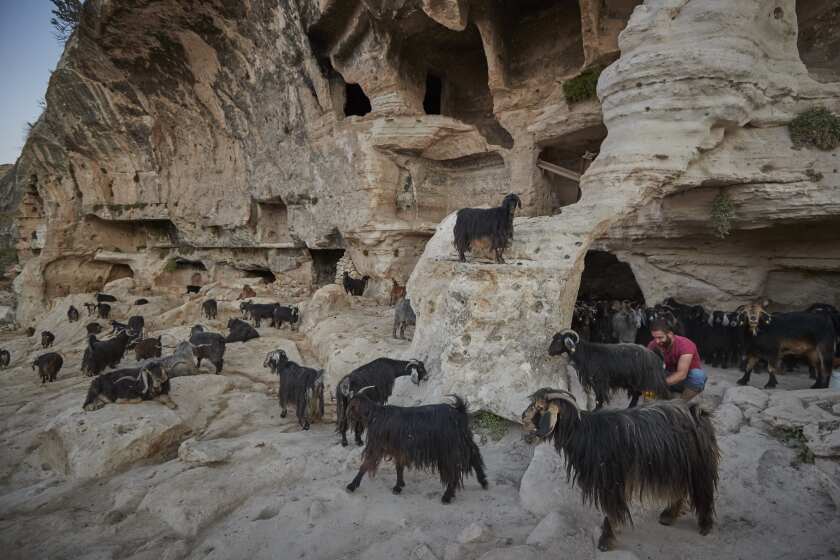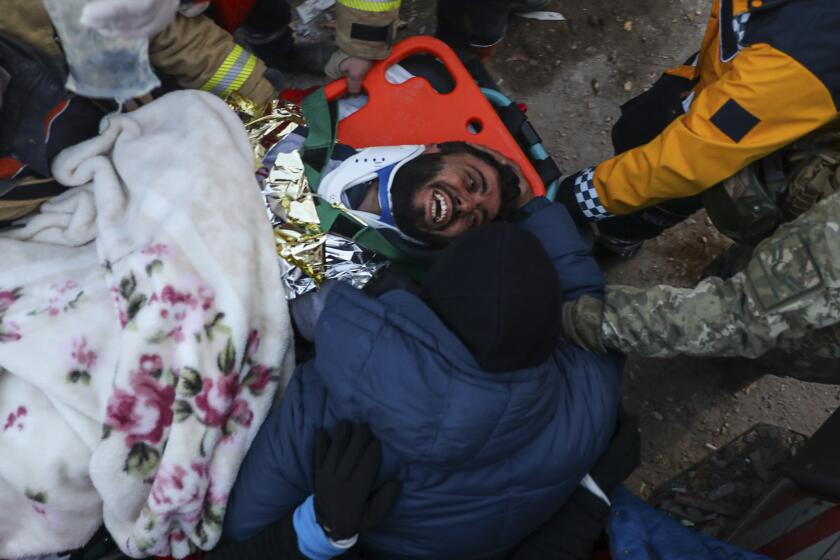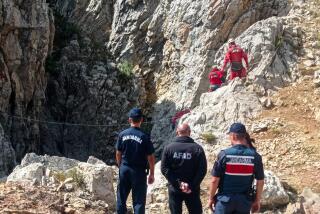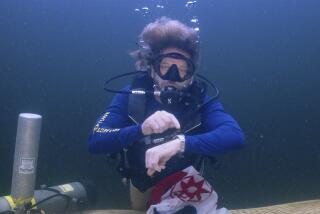American researcher thought he would die during 11 days trapped in a Turkish cave
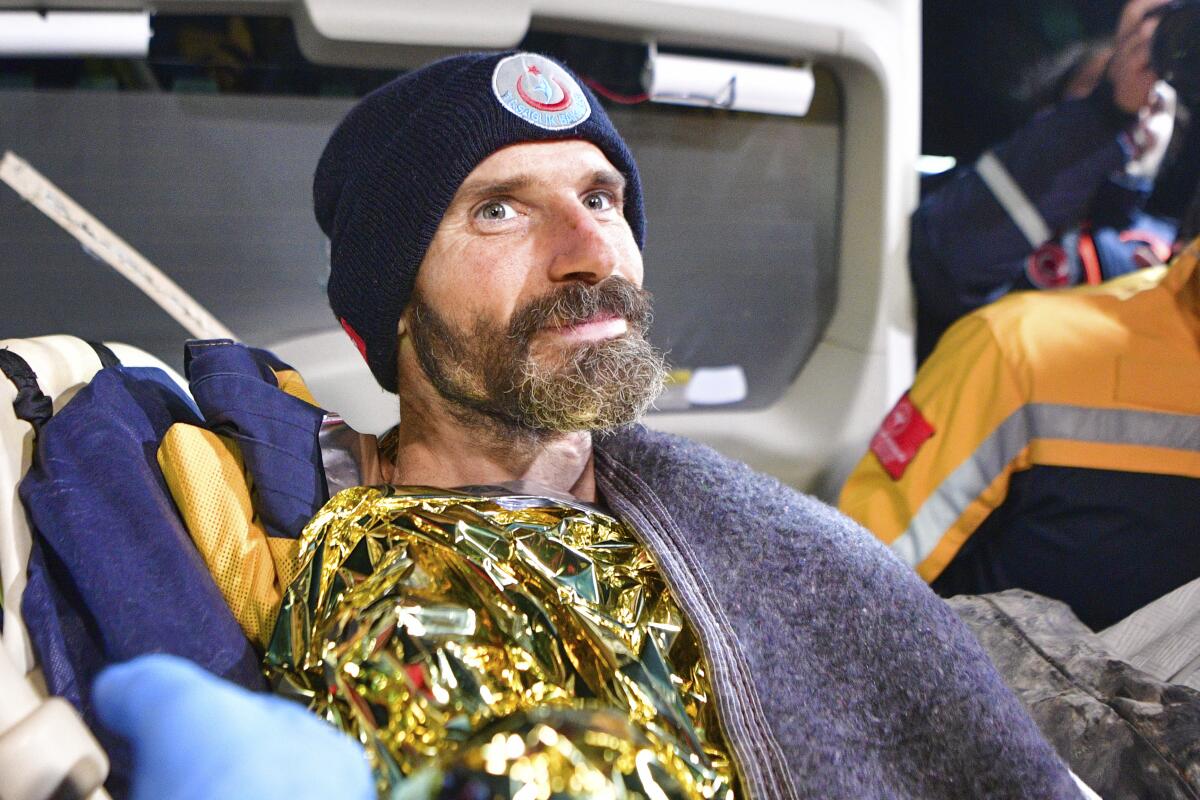
ISTANBUL — An American researcher who spent 11 days stuck in a Turkish cave after falling ill said Thursday that he thought he would die there before a complex international rescue operation got him out.
Mark Dickey, 40, appeared relaxed as he spoke to reporters at a hospital in Mersin, southern Turkey, where he is recovering from his ordeal.
Asked if he ever gave up hope while trapped more than 3,000 feet underground, Dickey replied: “No. But there’s a difference between accurately recognizing your current risk [and] giving up.
“You don’t let things become hopeless, but you recognize the fact that ‘I’m going to die.’ ”
Dickey fell ill Sept. 2 with stomach bleeding while mapping the Morca cave in southern Turkey’s Taurus Mountains. He vomited blood and had lost large amounts of it and other fluids by the time rescuers brought him back up to the surface Tuesday.
What caused his condition, which rendered him too frail to climb out of the cave on his own, remained unclear.
Erdogan said earlier Turkey might approve Sweden’s membership in NATO if European Union nations “open the way” to Turkey’s bid to join the EU.
Dressed in a blue T-shirt and with an IV drip attached to his hand, the experienced caver from Croton-on-Hudson, N.Y., thanked the Turkish government for acting “quickly, decisively” to get needed medical supplies down into the cave.
He also praised the international effort to save him. Teams from Turkey and several European countries mounted a challenging operation that involved pulling him up the cave’s steep vertical sections and navigating through mud and cold water in the horizontal ones.
Rescuers had to widen some of the cave’s narrow passages, install ropes to pull him up shafts on a stretcher and set up temporary camps along the way before the operation could begin. Medical personnel treated and monitored Dickey as teams comprising a doctor and three to four other rescuers took turns staying by his side at all times.
“This honestly was an amazing rescue,” said Dickey, who also is an experienced underground rescuer. “This was an amazing example of international collaboration, of what we can do together as a country, as a world.”
A controversial dam will swell the Tigris River until its waters submerge the ancient city of Hasankeyf, forcing longtime residents to flee and swallowing up cultural treasures.
Commenting on the “insane” public focus on his rescue, he added: “I really am blessed to be alive. It’s been a tough time. While I was trapped underground — I was trapped for 11 days — I learned that I had a nation watching, hoping, praying that I would survive: Turkey.”
In a later interview with ABC’s “Good Morning America,” Dickey recalled the moment he cleared the cave’s entrance. “I was happy to get to the surface and see those stars and smell the fresh air. That was a good moment,” he said.
He also paid tribute to his fiancee, Jessica Van Ord, who accompanied him on the expedition and left to obtain medical products that could be administered in the cave. “She made the climb out; she made the climb back in with the medical supplies,” Dickey told the broadcaster. “The second she came into that cave camp at a thousand meters [down] with four bags worth of fluid, that was a game-changer.
“She saved my life, period,” he continued. “She is one hell of a woman, one hell of a caver, one hell of a rescuer, one hell of a paramedic. She’s awesome.”
Five family members were among those rescued Saturday, five days after a major earthquake struck Turkey and Syria.
Dickey will continue his recovery at Mersin City Hospital. Laughing and joking during his brief news conference Thursday, he said he would “definitely” continue to explore caves.
“There’s risk in all life, and in this case, the medical emergency that occurred was completely unpredicted and unknown, and it was a one-off,” he said, adding that he “would love to” return to Morca cave, Turkey’s third-deepest, to complete his task.
Around 190 people from Bulgaria, Croatia, Hungary, Italy, Poland and Turkey took part in the rescue, including doctors, paramedics and experienced cavers.
The Italian National Alpine and Speleological Corps said that the rescue operation took more than 100 rescuers from around 10 counties a total of 60 hours and that Dickey was in the cave for roughly 500 hours.
More to Read
Sign up for Essential California
The most important California stories and recommendations in your inbox every morning.
You may occasionally receive promotional content from the Los Angeles Times.

